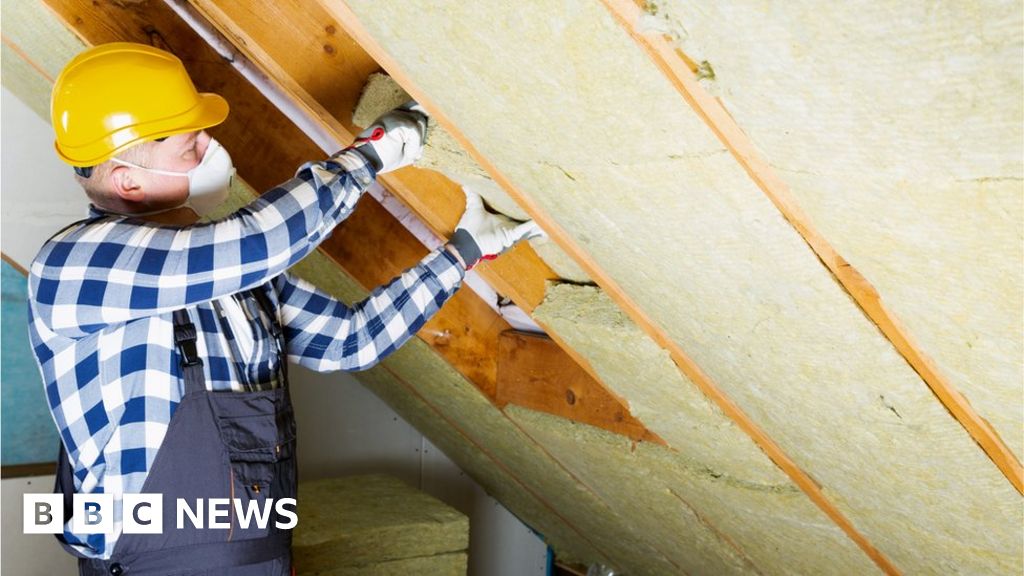Energy Bills: Fix Insulation To Tackle Cost Of Heating, PM Told

By Roger Harrabin
BBC environment analyst
Image source, Getty Images
Council homes will be fitted with new insulation
Better insulation could save UK households more than £500 a year on energy bills, according to a group of business organisations and charities.
The Energy Efficiency Infrastructure Group is calling on the prime minister to prioritise energy saving through home improvements.
It could save the UK £7.8bn a year, the group says.
The government is under political pressure to take action over rocketing gas bills.
Households have seen energy bills rise in recent months and further increases will take effect in April, when the energy price cap will be raised to take higher wholesale gas prices into account.
The government is exploring ways to support those on low incomes who will struggle to afford higher heating costs.
But the EEIG, which includes the CBI, Kingfisher, Energy Savings Trust and the green group WWF, says this and previous administrations are partly to blame for higher bills because they failed to ensure Britain's homes are adequately insulated.
"The cost-of-living crisis is being driven by soaring gas prices," said EEIG chairwoman Sarah Kostense-Winterton. "A permanent solution to lower bills is by reducing demand through energy efficiency measures.
"Emergency short-term measures for the most vulnerable households are crucial, but it's fundamental for the government to simultaneously focus on the long term to avoid futures crises.
"Green home retrofits have significant social, environmental and economic co-benefits, and stand out as a 'no regrets' solution to the energy crisis, climate crisis, and levelling up agenda."
Britain has the coldest and leakiest housing stock in western Europe, leaving residents particularly exposed to spikes in gas prices.
Successive governments have failed to implement policies to tackle the problem. The most recent insulation scheme, the Green Homes Grant, was scrapped after just six months.
The chancellor was urged by backbench MPs to use last autumn's Budget to introduce a multi-year energy efficiency programme, but he declined.
In the short term the EEIG wants the government to provide additional support for vulnerable households to prevent a fuel poverty emergency.
This would include expanding the Warm Homes Discount, an option the government is discussing.
But the EEIG insists that ministers must also bolster the Energy Company Obligation (ECO) which requires energy suppliers to help low-income households to fit energy-saving measures.
The group fears that the chancellor may suspend the long-term ECO funding and shift the cash to tackle the immediate bills problem instead.
Image source, PA Media
Energy bills are set to surge by hundreds of pounds in April
The EEIG is warning that cutting ECO would be damaging for households and industry, and would stall progress in making fuel-poor homes more energy efficient, risking green jobs and keeping households hooked on expensive gas.
In his manifesto Boris Johnson promised £9bn for energy efficiency up to 2030.
About £6bn was allocated to be spent this parliament but the EEIG says money not allocated amounts to a broken promise.
The EEIG is also calling for a new £3.6bn grant or subsidy scheme to help all households, including private owners, to insulate their homes.
At the moment, the EEIG maintains, two-thirds of households have no financial support for insulation, even though insulation is a vital part of the strategy to cut carbon emissions.
A government spokesman said it had already made huge progress in upgrading the energy efficiency of England's homes - from 9% rated grade C in 2008, to 40% today.
He said all new heating systems installed in UK homes from 2035 will be low-carbon technologies, like heat pumps or hydrogen-ready boilers. This will be a gradual, 14-year transition, and to cut the cost of heat pump, we're offering grants to households worth £5,000.
He added: "Improving energy efficiency is the best long term solution to tackling fuel poverty, which is why we are supporting households across the UK to improve their energy performance and reduce bills, having already invested £1.3bn this year alone to upgrade up to 50,000 homes.
"The Energy Price Cap will remain in place, shielding millions of customers from rising global gas prices, and we are continuing to support lower-income households through £4.2bn in support, including the Home Upgrade Grant, Energy Company Obligation and the new £500m Household Support Fund."
Follow Roger on Twitter @rharrabin
From Chip War To Cloud War: The Next Frontier In Global Tech Competition
The global chip war, characterized by intense competition among nations and corporations for supremacy in semiconductor ... Read more
The High Stakes Of Tech Regulation: Security Risks And Market Dynamics
The influence of tech giants in the global economy continues to grow, raising crucial questions about how to balance sec... Read more
The Tyranny Of Instagram Interiors: Why It's Time To Break Free From Algorithm-Driven Aesthetics
Instagram has become a dominant force in shaping interior design trends, offering a seemingly endless stream of inspirat... Read more
The Data Crunch In AI: Strategies For Sustainability
Exploring solutions to the imminent exhaustion of internet data for AI training.As the artificial intelligence (AI) indu... Read more
Google Abandons Four-Year Effort To Remove Cookies From Chrome Browser
After four years of dedicated effort, Google has decided to abandon its plan to remove third-party cookies from its Chro... Read more
LinkedIn Embraces AI And Gamification To Drive User Engagement And Revenue
In an effort to tackle slowing revenue growth and enhance user engagement, LinkedIn is turning to artificial intelligenc... Read more

